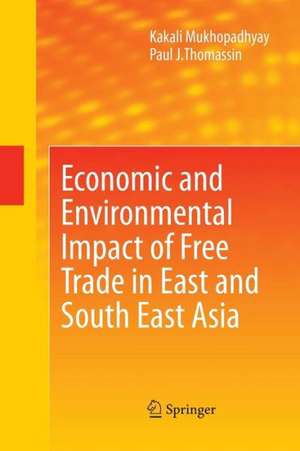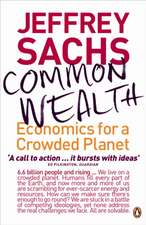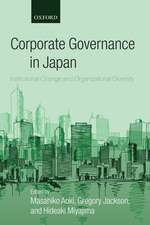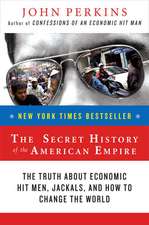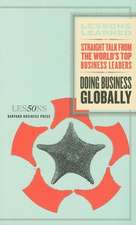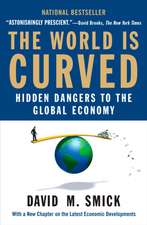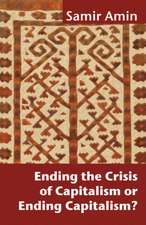Economic and Environmental Impact of Free Trade in East and South East Asia
Autor Kakali Mukhopadhyay, Paul J. Thomassinen Limba Engleză Paperback – 28 sep 2014
The study provides insight into pursuing a concrete multilateral trade liberalization policy (combining ASEAN and other countries in East Asia) and throws more light on the on-going trade and environment debate. This book will be a good addition to the field of trade and the environment. The academic community – primarily researchers and policy makers, and world bodies, such as the WTO, ADB and the World Bank, will benefit from the book.
| Toate formatele și edițiile | Preț | Express |
|---|---|---|
| Paperback (1) | 637.28 lei 6-8 săpt. | |
| SPRINGER NETHERLANDS – 28 sep 2014 | 637.28 lei 6-8 săpt. | |
| Hardback (1) | 643.48 lei 6-8 săpt. | |
| SPRINGER NETHERLANDS – 4 feb 2010 | 643.48 lei 6-8 săpt. |
Preț: 637.28 lei
Preț vechi: 749.73 lei
-15% Nou
Puncte Express: 956
Preț estimativ în valută:
121.95€ • 130.40$ • 101.67£
121.95€ • 130.40$ • 101.67£
Carte tipărită la comandă
Livrare economică 17 aprilie-01 mai
Preluare comenzi: 021 569.72.76
Specificații
ISBN-13: 9789400791121
ISBN-10: 9400791127
Pagini: 232
Ilustrații: XIX, 209 p.
Dimensiuni: 155 x 235 x 12 mm
Greutate: 0.33 kg
Ediția:2010
Editura: SPRINGER NETHERLANDS
Colecția Springer
Locul publicării:Dordrecht, Netherlands
ISBN-10: 9400791127
Pagini: 232
Ilustrații: XIX, 209 p.
Dimensiuni: 155 x 235 x 12 mm
Greutate: 0.33 kg
Ediția:2010
Editura: SPRINGER NETHERLANDS
Colecția Springer
Locul publicării:Dordrecht, Netherlands
Public țintă
ResearchCuprins
Review of Literature.- Features of the East and South East Asian Economies.- Theoretical Framework, Database and Scenario Development.- Economic Impact of Economic Integration.- Environmental Impact of Economic Integration.- Strategies for Green Trade.- Summary and Conclusion.
Textul de pe ultima copertă
In recent years, the East and South East Asian region has witnessed a rapid expansion of regional economic cooperation through bilateral and plurilateral free trade agreements. The current book attempts to comprehensively analyze the economic and environmental impacts of regional economic integration in East and South East Asia to the year 2020. This region has some of the fastest growing economies of the world. A global economic model was used to undertake the analysis. A rare feature of the book is the detailed environmental implications of the Regional Trade Agreements focusing on air, water, and waste pollution. Economic integration among the East and South East Asian region has been an important agenda item for the academic and policy communities in recent years.
The study provides insight into pursuing a concrete multilateral trade liberalization policy (combining ASEAN and other countries in East Asia) and throws more light on the on-going trade and environment debate. This book will be a good addition to the field of trade and the environment. The academic community – primarily researchers and policy makers, and world bodies, such as the WTO, ADB and the World Bank, will benefit from the book.
The study provides insight into pursuing a concrete multilateral trade liberalization policy (combining ASEAN and other countries in East Asia) and throws more light on the on-going trade and environment debate. This book will be a good addition to the field of trade and the environment. The academic community – primarily researchers and policy makers, and world bodies, such as the WTO, ADB and the World Bank, will benefit from the book.
Caracteristici
Concentrates on the fastest growing economies of the world Focuses on the future of the world economy as well as promising ASEAN region to 2020 Makes a comprehensive analysis of economic and environmental impact of the regional economic integration Unique compared to other books which are primarily a collection of articles Deals with the most recent controversial issue - the concern of WTO, World Bank, academicians and policy makers
